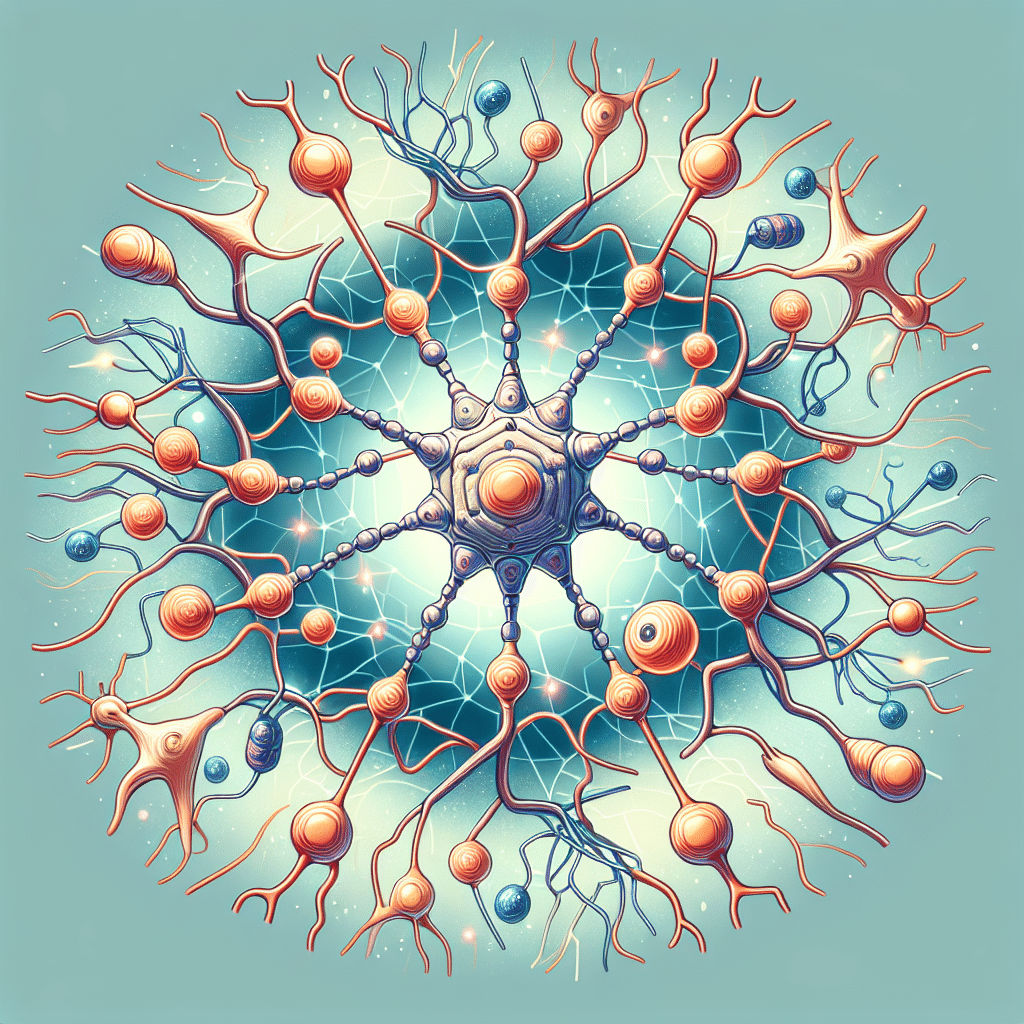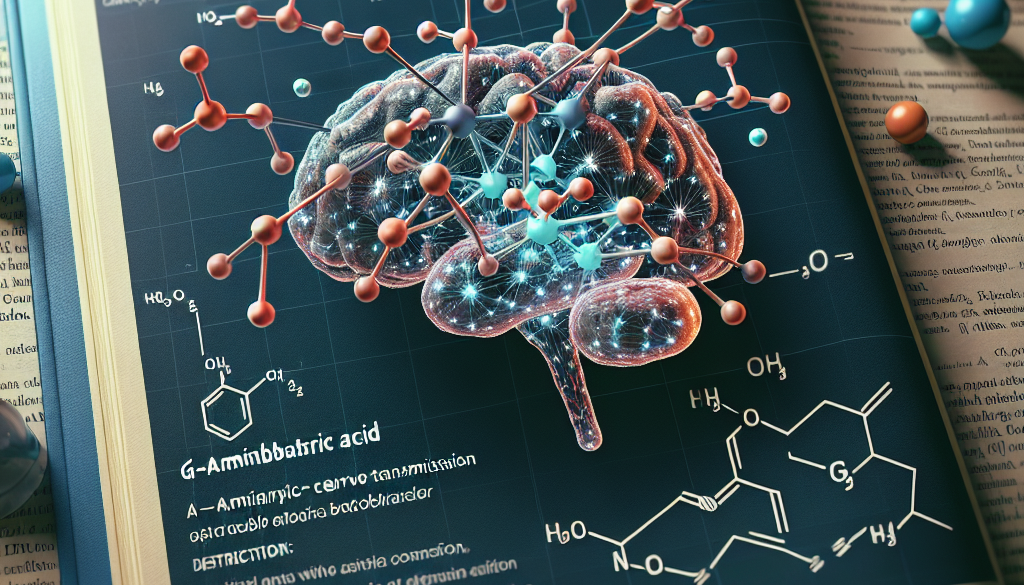Understanding γ-aminobutyric Acid
-
Table of Contents
- γ-Aminobutyric Acid (GABA): Understanding Its Crucial Role in the Brain
- What is γ-Aminobutyric Acid?
- The Mechanism of GABA Action
- Functions of GABA in the Brain
- GABA’s Role in Health and Disease
- Therapeutic Applications of GABA
- Case Studies and Research on GABA
- Statistics on GABA-Related Disorders
- Conclusion: The Significance of GABA in Neurological Health
- Enhance Your Health with ETprotein’s High-Quality Protein Products
γ-Aminobutyric Acid (GABA): Understanding Its Crucial Role in the Brain

γ-Aminobutyric Acid, commonly known as GABA, is an essential neurotransmitter that plays a pivotal role in the functioning of the brain. It is the chief inhibitory neurotransmitter in the central nervous system (CNS) and is vital for maintaining the delicate balance between neuronal excitation and inhibition. This article delves into the intricacies of GABA, exploring its functions, mechanisms, and implications for health and disease.
What is γ-Aminobutyric Acid?
GABA is a naturally occurring amino acid that acts as a neurotransmitter in the brain. Unlike other neurotransmitters that stimulate neurons, GABA’s primary function is to reduce neuronal excitability throughout the nervous system. It is synthesized in the brain from its precursor, glutamate, through the action of the enzyme glutamic acid decarboxylase (GAD).
The Mechanism of GABA Action
GABA operates by binding to specific receptors on the surface of neurons. There are two main types of GABA receptors: GABAA and GABAB. GABAA receptors are ionotropic, meaning they form ion channels that open upon GABA binding, leading to an influx of chloride ions into the neuron and resulting in hyperpolarization. This makes it more difficult for the neuron to fire an action potential. GABAB receptors, on the other hand, are metabotropic and work through G-proteins and second messengers to open potassium channels, further contributing to the inhibition of neuronal activity.
Functions of GABA in the Brain
GABA is involved in a variety of functions within the brain, including:
- Regulating anxiety: GABA has a calming effect on the brain, which can help to alleviate feelings of anxiety.
- Enhancing sleep: Adequate levels of GABA can promote restful sleep by reducing neuronal excitability.
- Controlling muscle tone: GABA activity is crucial for maintaining muscle relaxation and preventing excessive muscle tension.
- Modulating cognition: GABA plays a role in cognitive processes such as learning and memory.
GABA’s Role in Health and Disease
Imbalances in GABA levels or disruptions in its signaling pathways can lead to various neurological and psychiatric conditions. For instance:
- Anxiety disorders: Reduced GABA activity has been linked to increased anxiety and panic attacks.
- Epilepsy: A deficiency in GABA can lead to seizures due to uncontrolled neuronal firing.
- Huntington’s disease: This neurodegenerative disorder is associated with decreased levels of GABA in certain brain regions.
- Sleep disorders: Insufficient GABA activity can contribute to sleep disturbances such as insomnia.
Understanding the role of GABA in these conditions is crucial for developing targeted treatments that can restore the balance of neuronal activity in the brain.
Therapeutic Applications of GABA
Due to its inhibitory effects on the CNS, GABA has become a target for various therapeutic interventions. Medications that enhance GABA activity, such as benzodiazepines and barbiturates, are commonly used to treat anxiety, insomnia, and epilepsy. Additionally, GABA supplements are marketed for their potential to promote relaxation and improve sleep quality, although their efficacy is still under investigation.
Case Studies and Research on GABA
Several studies have highlighted the importance of GABA in brain function. For example, research has shown that individuals with anxiety disorders often have altered GABA receptors, which may contribute to their symptoms. In epilepsy, GABAergic drugs have been effective in reducing seizure frequency by enhancing GABA’s inhibitory effects.
Statistics on GABA-Related Disorders
The prevalence of GABA-related disorders underscores the importance of this neurotransmitter in maintaining mental health. Anxiety disorders are among the most common psychiatric conditions, affecting about 18% of the adult population in the United States annually. Epilepsy affects approximately 1% of the global population, with GABAergic dysfunction playing a significant role in the pathophysiology of the disease.
Conclusion: The Significance of GABA in Neurological Health
In summary, γ-Aminobutyric Acid is a fundamental neurotransmitter that helps regulate brain activity by inhibiting excessive neuronal firing. Its role in conditions such as anxiety, epilepsy, and sleep disorders highlights the need for continued research into GABAergic mechanisms and treatments. Understanding GABA’s functions and dysfunctions is key to developing effective interventions for a range of neurological and psychiatric disorders.
Enhance Your Health with ETprotein’s High-Quality Protein Products
If you’re looking to support your overall health and well-being, consider incorporating ETprotein’s high-quality protein products into your diet. ETprotein offers a wide range of organic bulk vegan proteins that are non-GMO and allergen-free, making them suitable for various dietary needs. Their products, including Organic rice protein, pea protein, and pumpkin seed protein, provide a neutral taste and high purity, ideal for supporting your nutritional goals.
For those interested in the potential benefits of amino acids like GABA, ETprotein also supplies L-(+)-Ergothioneine (EGT) in various grades suitable for pharmaceutical, food, and cosmetic applications. EGT is known for its antioxidant properties and may contribute to neurological health.
To explore ETprotein’s offerings and how they can fit into your health regimen, contact them at sales(at)ETprotein.com for more information or to request samples.
About ETprotein:
ETprotein, a reputable protein and L-(+)-Ergothioneine (EGT) Chinese factory manufacturer and supplier, is renowned for producing, stocking, exporting, and delivering the highest quality organic bulk vegan proteins and L-(+)-Ergothioneine. They include Organic rice protein, clear rice protein, pea protein, clear pea protein, watermelon seed protein, pumpkin seed protein, sunflower seed protein, mung bean protein, peanut protein, and L-(+)-Ergothioneine EGT Pharmaceutical grade, L-(+)-Ergothioneine EGT food grade, L-(+)-Ergothioneine EGT cosmetic grade, L-(+)-Ergothioneine EGT reference grade and L-(+)-Ergothioneine EGT standard. Their offerings, characterized by a neutral taste, non-GMO, allergen-free attributes, with L-(+)-Ergothioneine purity over 98%, 99%, cater to a diverse range of industries. They serve nutraceutical, pharmaceutical, cosmeceutical, veterinary, as well as food and beverage finished product distributors, traders, and manufacturers across Europe, USA, Canada, Australia, Thailand, Japan, Korea, Brazil, and Chile, among others.
ETprotein specialization includes exporting and delivering tailor-made protein powder and finished nutritional supplements. Their extensive product range covers sectors like Food and Beverage, Sports Nutrition, Weight Management, Dietary Supplements, Health and Wellness Products, and Infant Formula, ensuring comprehensive solutions to meet all your protein needs.
As a trusted company by leading global food and beverage brands and Fortune 500 companies, ETprotein reinforces China’s reputation in the global arena. For more information or to sample their products, please contact them and email sales(at)ETprotein.com today.














